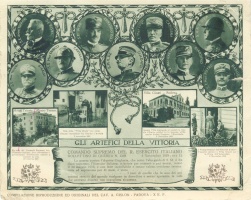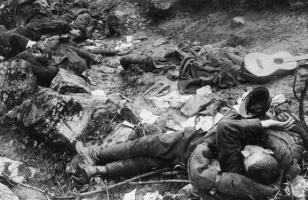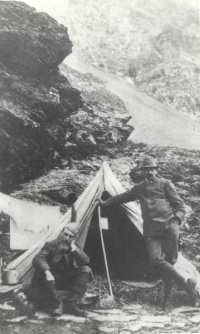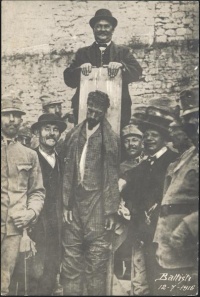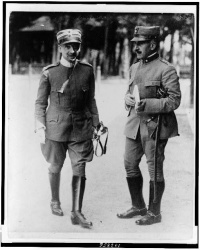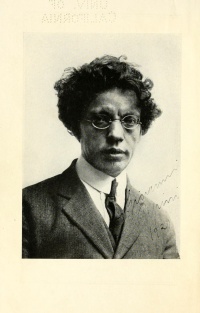Preliminaries to the Question of Meaning↑
The suggested title for this contribution elicits some unease in the present author insofar as the terms “war” and “meaning” in her view are largely mutually exclusive. “Meaning” is of course not the same as “purpose,” and indeed the majority of wars certainly have a (more or less justified) purpose. “Meaning” can be best conceded to that form of armed conflict that is characterized as a necessarily defensive war in the face of an existential threat. Italy’s participation in the First World War, however, did not serve the purpose of defense. On the contrary, after the July Crisis in 1914 and Austria-Hungary’s declaration of war against Serbia, which triggered the well-known chain reaction of further declarations of war, the country had in fact a full ten months to decide whether it wanted to enter the current, now major European conflict, and on which side – namely, that of the Entente or the Central Powers, its allies since 1882. After the wait-and-see retreat to a neutral position and the complicated negotiations with the two sides, the government of right-wing liberal Prime Minister Antonio Salandra (1853-1931) finally opted for the intervento and declared war against Austria-Hungary in May 1915 (the declaration of war against the German Reich did not occur until August 1916). It fought on the side of the Entente at the cost of enormous human causalities. Well over 600,000 regnicoli (“Reich Italians”) were killed in action, amounting to approximately the population of the “unredeemed” areas still dominated by Austria. In the (secret) London Agreement of April 1915, Trentino, (German-speaking) South Tyrol, Trieste, Gorizia-Gradisca, Istria, and Dalmatia (all multi-ethnic, mixed language areas), among other territories, were pledged to Italy. This far exceeded the substantial (“parecchio”)[1] territorial gains that had already been negotiated with Austria through diplomatic channels, and the pragmatic politics of the left-liberal ex-Prime Minister Giovanni Giolitti (1842-1928), who wanted to keep the country from the war, were abandoned. The dynamic minority of pro-war advocates, the so-called interventionists (nationalists, risorgimental democrats, conservatives, anarcho-syndicalists, etc.), imposed its will on the uncoordinated majority of war opponents (giolittiani, socialists, Catholics, etc.) in an escalating campaign that culminated in the Roman “Radiant May” and the hate speech of the renowned patriotic poet Gabriele D’Annunzio (1863-1938) against Giolitti and the neutralists. While a highly respected historian like Rudolf Lill may have called the Italian-Austrian War of 1915-1918 “the most pointless conflict of the entire world war,”[2] the fervor of the agitation, which divided the country, and the dangerously increasing capacity for violence with which the interventionists conquered the public space (indeed, the “red” Piazza of the labor disputes became the green, white, and red of the national flag)[3] show the enormous potential meaning that the proponents were able to attribute to the so-called “War of Atonement” and its opponents were able to accordingly dismiss. The aim in the following will therefore be to inquire about the various dimensions of meaningfulness or strategic expediency cloaked as meaningfulness, by which the adversaries allowed themselves to be led, and, furthermore, how this struggle ended and also came to be manifested elsewhere.
Intellectuals and war in Europe↑
Intellectuals made a significant contribution to bringing people in step with conflict, mobilizing people to take to the streets, and to the country’s entry into the war. This phenomenon was by no means limited to Italy: The war was greeted by intellectual elites on all sides as a “great opportunity” for smashing the allegedly rotten and decrepit (or discredited) bourgeois systems and institutions. It was even welcomed euphorically as a “sacred holocaust”[4] – Gabriele D’Annunzio – as a “forge” which, in the course of the revaluation of all values, would give rise to a “new man”[5] – Ernst Jünger (1895-1998) – a “man of steel.” It was the dialectic of criticism of the present and war apologetics that stirred leading intellectuals of Europe, causing them to seek self-realization, redemption, or relief from a profound crisis of meaning in the destruction – in the collapse of “a world of peace, which [the artist, the soldier in the artist] was so utterly tired of”[6] – Thomas Mann (1875-1955). Needless to say, they played into the hands of those who endorsed a realpolitik that was free of utopian longings and who sought to expand their spheres of influence.
The Special Case of Italy: “L’Italia, così com’è, non ci piace”↑
Italy is a special case nonetheless. In no other country were the young bearers of culture so deeply alienated from the reality of civic society and its leadership, or was there so great a willingness to realize a moral renewal. Nowhere else were forces outside of government and parliament able to exert such a significant influence on the country’s entry into the world war. It was less economic and political pressure, than intellectuals of various stripes who acted as “bulldozers” in the dismantling of the precarious balance of integration politician Giolitti’s liberal state. Why did creative artists distance themselves from their own bourgeois-liberal society at the pinnacle of its expansion? Why did they fight angrily and contemptuously against the moderately prosperous “Italietta” of Giolitti, the shrewd veteran politician who sought to engage with the opposition? Why were they not willing to alternatively exploit their dissatisfaction in the sphere of parliamentary democracy? In an epoch-making work, Il mito della grande guerra, Mario Isnenghi examined an extensive corpus of literary testimonies from the incubation period of the Great War regarding the socio-political, but mainly psychological motives which inspired the moderate and radical rebels to turn to the panacea of war – in other words, the war as pharmakon for individual and collective fears, deficits, and evil. Since the publication of this seminal text, we know more about the redemption longings, or nihilism, of these “pre-political” writers and thinkers[7] who privileged “dying and becoming!,” the fatal principle of a “rebirth” which came from the destruction of the existing order. “L’Italia, così com’è, non ci piace” – Giovanni Amendola (1882-1926) – can be used as the epigraph of a generation (more or less) of public opinion-makers: from D’Annunzio’s revanchist “Mare Nostrum” lyric poetry around the turn of the century and Filippo Marinetti’s (1876-1944) founding manifesto of 1909 about the “great incendiary” futurism to the Malthusian bloodlust, which Giovanni Papini (1881-1956) and Ardengo Soffici (1879-1964) unleashed in 1915 as a greeting for the Great War in their magazine “Lacerba.” This was followed by excessive references to “dying!,” with “becoming” ending in the fascists’ totalitarian state.
Nationalism and Interventionism↑
In 19th and 20th century Europe, a limited concept of the nation – coinciding with a territorial state and postulating ethnic and linguistic-cultural homogeneity that is thus constitutive of nationalism – was the cause of untold suffering. For nationalism, a supra-national state such as the Habsburg Empire necessarily served as the unqualified enemy. It seems therefore surprising perhaps that it was the “real” nationalists of the “Associazione Nazionalista Italiana,” (A.N.I.) founded by the writer Enrico Corradini (1865-1931) in 1910, who first espoused the intervento under the auspices of the Triple Alliance. This not only included Wilhelmine Germany, which was admired for its militarism and its anti-democratic tendencies, but also Austria, the “archenemy” and oppressor of the “unredeemed” Italians from “Trento and Trieste.”[8] But for Enrico Corradini and his comrades-in-arms – Luigi Federzoni (1878-1967), mastermind Alfredo Rocco (1875-1935) – conducting a war against a foreign power was equivalent to conducting a war against the enemy within (i.e. the peace-seeking left, the progressive liberals, the “impotent state” in general). They therefore welcomed it as a nation-unifying and purifying bloodbath[9] in which the external conflict would take the place of the inner-class struggle (and give a helping hand to the defense industry). “Proletarian nations” such as Italy, it was believed, had a right when confronted with “plutocratic” countries like Britain and France to seize their “place in the sun” through expansion. The war aims of the A.N.I. were supremacy in the Adriatic region and in the eastern Mediterranean, and, domestically, the elimination of the parliamentary system and the democratic order. This reactionary nationalism, which would finally fuse together with its “big brother” fascism in 1923, effectively served as a catch basin for many irredentist intellectuals from the “unredeemed” areas. This included, among others, the Triestan Ruggero Timeus (1892-1915), who introduced the racist myth of Adriatic super-Italianness into the discourse, and the Trentino Ettore Tolomei (1865-1952), a fanatic advocate of the Brenner frontier and the Italianization of South Tyrol, who did not shrink from committing systematic falsifications and was added to the Italian peace delegation as an expert (!) in 1918-1919. The nationalist right certainly made use of the redemption myths of irredentism as a cover for their social-Darwinist imperialism, but in truth they cynically disdained them as a “useful deception,”[10] much like they did the humanitarian and libertarian ideals of the democratic interventionists with whom they nolens volens acted in concert (and vice versa). An eloquent prophet of this imperialist nationalism was Gabriele D’Annunzio, who had long been the most influential poetic voice for Italy’s Adriatic and African expansionism. As a result, the forum of Corriere della Sera, whose director Luigi Albertini (1871-1941) was a staunch war advocate, was generously put at his disposal.
While the propagandists of the A.N.I. took blatant recourse to the Mazzinian ideal of the “Third Rome,” the “modernist nationalists”[11] pushed for a consensus to enter the war by initiating violent cultural revolutionary and iconoclastic programs. The futurists and the groups that coalesced around the magazines “Leonardo” (1903-1907), “Lacerba” (1911-1915) and, most famous of all, “La Voce” (1908-1916), not to mention the socialist maximalist Benito Mussolini (1883-1945), who was a neutralist converted into one of the most active of agitators for the war, took root in the common ground of a nationalism that was manifested in the myth of the “new Italian.” The tremendous upheaval of modernity and the dynamism of the industrial mass society dominated by competition demanded an anthropological transformation. Only the concentration of the national forces on the conflict, the creation of a warlike, aggressive Italian, and the liquidation of democracy and the traditions of Enlightenment liberalism could therefore help to regenerate the nation and facilitate the arrival of modernism. This explosive mixture of historical inferiority complexes and “futuristic” delusions of grandeur – from which sprang the desire for a guerra espiazione (“War of Atonement”)[12] – was partially due to Italy’s controversial advancement toward greater unification (occasionally resulting from military defeats and diplomatic victories), as well as to comparisons that were being made to the major imperialist powers of the era. To some extent, it was also due to the haunting philosophemes of irrationalists, preachers of violence, and elite theorists – for example Friedrich Nietzsche (1844-1900), Henri Bergson (1859-1941), Georges Sorel (1847-1922) and Vilfredo Pareto (1848-1923). Futurists and Lacerbians, but also revolutionary syndicalists and radical republicans touted violence and war in the sense of Georges Sorel as a pedagogical means for the formation of a new ethic of manly courage. This “dehumanized supermanhood”[13] was programmatically set forth in the main theses of Marinetti’s founding manifesto: “We will glorify war – the world’s only hygiene – militarism, patriotism [...] and the beautiful ideas worth dying for.” It perhaps found its most repulsive expression in the “necrophiliac”[14] war literature of the Futurists’ Pope himself and in Giovanni Papini’s (1881-1956) provocative verbal orgies on the eve of Italy’s entry into the war:
In view of these bloodthirsty regurgitations, it is understandable that a neutralist and a defender of the bourgeois order like the then most important Italian philosopher, the Germanophile and neo-Idealist Benedetto Croce (1866-1952), would remark on the moral depravity of the intellectual rowdies. Nonetheless, they had become “battering rams”[16] against positivism right before his very eyes, and though he chided the irrationalism and the irresponsibility of the activist interventionism from within pages of his influential magazine “Critica,” he acted at the same time like an apologist instructor of history who was convinced of the victory of reason. Unlike his peers Bertrand Russell (1872-1970) or Romain Rolland (1866-1944), who desperately sought to defend common European values with his appeal Au-dessus de la mêlée, Croce kept his distance from pacifist initiatives and remained compliant with the system. At this point in time, Italy did not offer fertile ground for the development of an authentic pacifism.
From D’Annunzio and the other authors who had been infected with the “superman” virus, the brilliant (mass-) communicator Marinetti took on preformed thought and emotional patterns (e.g. Latin racism and anti-democratic elitism, the cult of the battle-ready male physique, and the frenzied depoliticized aesthetics of violence). He further blended them with genuine futuristic myths like the pseudo-religious glorification of speed and modern machinism and used every available advertising technique of the period to put them into circulation. The aesthetic stylization of the modern machine war as an orgiastic festival of technology and the senses – the sensual pleasure of the war for its own sake and private enjoyment (“Marciare, non marcire!”“Osare l’inosabile!”), as expressed by the most prominent bards of the auxiliary troop of intellectuals, D’Annunzio and Marinetti – repeatedly raised the question of how much this “gas-mask aesthetics”[17] actually stood at cross purposes with the process of civilization.
The Galaxy of Democratic Interventionism↑
Despite having different goals and methods, war advocates on the right and left, both democratic and paternalistic, were able to converge in the shared desire for Italy’s palingenesis. Different movements found common cause in so-called “democratic interventionism.” Republicans who were inspired by Mazzini’s ideas saw the world war as the fourth Italian War of Independence, and thus the fulfillment of the Risorgimento. Rallying to the cry “Trento e Trieste!,” the war signified the possible return to the motherland of the terre irredente, which were still members of the Dual Monarchy. However, they not only demanded national self-determination for Italy, but, in the European spirit of their ideological patriarch, for all “oppressed” nations. Their guiding principles were the destruction of the “people’s dungeon” Austria-Hungary, the elimination of “Prussian militarism,” and the establishment of democratically organized European nation-states, which were to be assembled in a united Europe. Yet, as already indicated, the late-risorgimental patriotism of the republicans served as welcome camouflage for the naked power aspirations of the imperialists, which went far beyond Trento and Trieste, “the Siamese twins of the nationalist rhetoric.”[18] Leading proponents the democratic interventionism included right socialist and former editor of “Avanti” Leonida Bissolati (1857-1920), the independent left historian and publisher of the “Unità” Gaetano Salvemini (1873-1957), and Cesare Battisti (1875-1916), former socialist deputy to the Vienna Reichstag from Trento. Salvemini, a sworn enemy of Giolitti (“il ministro della mala vita,”)[19] tried as an opinion leader – similar to Giuseppe Prezzolini (1882-1982) by means of “La Voce” – to create cadres that would define the discourse about Italy’s moral regeneration. With the nationally and internationally issued slogan Delenda Austria!, Salvemini was able to significantly influence the government’s foreign policy in the last year of the war in the direction of liquidating the Habsburg multi-ethnic state. The fate of Cesare Battisti is emblematic of the tragic conflict situation that Austro-Italians – like many other residents of European border regions – were confronted with due to the outbreak of the war, when their multiple affiliations proved to be no longer compatible. Battisti, a tireless and (because the Austrian delaying tactics) frustrated champion of Trentino’s autonomy and the establishment of a university in the terre irredente, went from being an Italian patriot to an Austrian traitor and was executed as such after his capture. The conversion of this convinced democrat from internationalist socialist to leading exponent of interventionism, who wound up in embarrassingly close contact with public tribunes like Tolomei, Corradini and D’Annunzio[20] and ultimately experienced his life’s most heroic moment at the front, are less explicable as transformational turning points than as a return to Battisti’s most profound inspiration: Italy. Battisti’s Catholic countryman and Diet colleague Alcide De Gasperi (1881-1954) – longtime Italian Prime Minister after the Second World War, leader of the Christian Democrats, and promoter of European unification – went in the opposite direction. After his neutralist intermediary activity in the context of the Vatican diplomacy proved to be in vain, he returned to Austria, where he remained until 1918. Like the majority of Trentino’s inhabitants, he likely did not see the need for the intervento.
Marginal Intellectuals: Volunteerism and Disappointment↑
Among the democratic interventionists were two significant Triestan authors, Scipio Slataper (1888-1915) and Giani Stuparich (1891-1961) – a highly decorated world war officer. Before the war, they had introduced the national question into the discussion of the leading intellectual forum “La Voce,” specifically within the context of a peaceful coexistence within a supranational state formation. They opposed their project of a “cultural irredentism” to the intransigent irredentism of the nationalists by aiming for a third way between austriacantismo and overwrought italianità, namely, the autonomous dimension of a national-cultural identity that did not necessarily need to converge with the state-political identity. However, this intercultural opening inspired by the nationality program of the Austrian Social Democracy could not withstand the trials of the war. The charismatic Slataper, who not only mapped out the literary landscape of Trieste (Il mio Carso, 1912), but also a pluralistic identity in the border area, mutated with startling speed into a militant interventionist. His journalistic activism came together with the theses of the imperialist right, in particular with regard to the “borders to the east.” The inconsistency of his political thought and his recent choices, including one concerning the hero’s death in “his” Karst, could be interpreted – assuming one was interested in finding reasons as in the case of Battisti – as a drama of a dynamic will and a “monistic” national-irredentist resolution of multipolar tensions. War-time volunteer and Slataper’s friend Stuparich was not designed for death, but rather for the life-long – ultimately aporetic – literary mourning of a survivor. His laconic diary from the first months of the war on the Isonzo, Guerra del ‘15, illustrates the disillusion in exemplary fashion – the fading of the risorgimental dreams of a republican interventionist in the trenches of an at once senseless and murderous war of position. Stuparich’s decision to eventually take off the red Garibaldi-shirt he initially wore under the uniform is an eloquent symbol of an ideological crisis. The depersonalization and deadening of one’s conscience to a point of apathy; the abrasiveness of the commands of superior officers, who – like the supreme commander, General Luigi Cadorna (1850-1928) – think little of “intelligent bayonets”; and the sidelong glances of many comrades who, unlike the irredentist volunteers, by no means “wanted” to fight for “Trento e Trieste”: All this finally also erodes the ideal of a “just war.” In an entirely different way than the introverted Triestan, and at a much later stage, another intellectual from the border would deal with similar questions in a highpoint of war literature. Emilio Lussu (1890-1975) – a Sardinian interventionist, invulnerable officer in full solidarity with the farmers and herdsmen entrusted to him, founder of the autonomist Sardinian Action Party, theorist and leader of the insurrection, and head of the organized resistance against the fascist regime – depicts One year on the plateau (Asiago, 1916) with magisterial irony and palpable acrimony. The book is a radical polemic against Italian warfare, and against the inhumanity and incompetence of the General Staff and the senior officers, who see soldiers as nothing more than “cannon fodder” and yet who are also not able to even use them properly. This arrogant war hierarchy is the mirror image of the ruling class of the Italy Lussu referred to as the “fiction of a liberal state.” The Sardinian writes against the utter humiliation and dehumanization of a mankind capable of thought and of taking responsibility, against the destruction of reason, which would bring about the Second World War a year after his book’s publication. This slim volume from the pen of an exile is testimony of the European scope of the concern about the true nature of the war of 1915-1918, comparable to Henri Barbusse’s (1873-1935) Le Feu or Erich Maria Remarque’s (1898-1970) All Quiet on the Western.
The Divided Left↑
In the heterogeneous galaxy of interventionism, we find on the extreme left the leader of the revolutionary syndicalists, Alceste De Ambris (1874-1934). Inspired by Georges Sorel’s consecration of violence, he saw in the war a historic opportunity to unleash the revolutionary potential of the Italian proletariat. The hope for a new, fairer state of productive forces also seems to have motivated him later to develop the constitution for the short-lived Republic of Fiume as head of D’Annunzio’s cabinet. As mentioned above, the maximalist Benito Mussolini joined the protagonists of the interventismo rivoluzionario. After his about face in support of the war, resulting in his resignation as editor-in-chief of the socialist central organ “Avanti” and his expulsion from the party, he founded (with French money and the money of interested industry lobbies) the newspaper “Popolo d’Italia.” He consequently triggered a landslide in the range of opinions. Indeed, in the long months of tense speculation quite a few opponents of the war were either absorbed by the other party (including especially the Catholics) or resigned. Leonida Bissolati’s reform socialists (PSRI), expelled by PSI in 1912, increased the ranks of the interventismo democratico, while the PSI persisted in its pacifist and neutralist position.
Given the ignominious failure of the Socialist International at the outbreak of war – it was not the proletarian class consciousness that triumphed in Germany, Austria and France, but rather the mother country itself – the insistence of the main Socialist Party of Italy on absolute neutrality was a respectable exception. Of course, they were not able to maintain their initial strategy to actively resist the mobilization and had to back away from getting into a confrontation with war-ready patriots: né aderire né sabotare.[21] The socialists alone voted against the war in the crucial parliamentary session on 20 May, which took place against the backdrop of the street terror incited by interventionist tribunes (whose ringleader was D’Annunzio). The prophecy made here by their leader Filippo Turati (1857-1932) would be borne out in the worst way imaginable all across Europe: In this war, there would be no victors, for everyone would be vanquished.
Guerra festa and Allegria di naufragi↑
“Blood begins to seep from the body of the fatherland. Can you feel it? The killing, the destruction has begun,” writes D’Annunzio,[22] death-addicted and rendering homage to his fictional tenth Muse Energeia on the day of Italy’s official entry into the war. With an all-access pass to every theater of war, D’Annunzio began to vividly realize his motto “vivere pericolosamente” as a private soldier, highflyer, and propaganda technician. Marinetti was also preparing to consume the “blood-red holidays of genius,” initially as a member of a cyclist troop. The existential meaning with which the more or less narcissistic intellectuals imbued their participation in the war cannot be fully explored here. The war was also praised as a festive journey of the senses in the novels of Ardengo Soffici and Giovanni Comisso (1895-1969). Piero Jahier’s (1884-1966) Con me e con gli alpini is typical of the blissful embedding of the individual in a new community of values of fellow comrades-in-arms. These constructive integration mechanisms of an alienated intellectual stood in contrast to those that were regressive. For instance, beyond the stimulating aspects of an activist interventionism, in Esame di coscienza di un letterato author Renato Serra (1884-1915) gives himself over fatalistically to the dissolution of his own ego within the group. The war thus did not redeem anyone or anything, nor did the individual make history. Only one thing counted: Andare insieme. Serra’s cupio dissolvi – which recalls Giuseppe Ungaretti’s (1888-1970) Allegria di naufragi – is the other, equally irrational side of the triumphant potential of the self-proclaimed supermen’s and vitalist arsonists’ aggression. But even a cool observer like Prezzolini in no way wanted to miss the “unique opportunity” to subvert the status quo – as regards both the individual and the community.
A War without Victors↑
A preliminary assessment on the day of the declaration of war, 23 May 1915, would have revealed the following: The aesthetic control mechanisms of violence had worked; the mobilization of the masses by the interventionists had moved the government of the sacro egoismo - Salandra/Sidney Sonnino (1847-1922) - to expedite the decision that led to the signing of the agreement with the Entente; and, given a short, victorious war, the classe dirigente could expect the immobilization of the subversive forces and an overcoming of the systemic crisis. This calculation did not pan out, however. After a long war that was costly beyond all expectations, the country had not only to mourn the aforementioned hecatombs of dead and countless invalids, but also the economic and financial bankruptcy and the inexorable intensification of the social and political differences, which opened up the floodgates to the totalitarian developments in the post-war period. In the Treaty of Saint-Germain in 1919, Italy was not granted all the territories it claimed. One protagonist of the resulting revisionism was, once again, D’Annunzio, who helped channel the prevailing resentment with his appealing rallying cry concerning a “mutilated victory” (vittoria mutilata). He also occupied Fiume – now Rijeka – and established there a corporate free state with some social revolutionary aspects. While Giolitti brought this spectacular adventure, which united right and left – i.e. combatants, nationalists, futurists, former democratic interventionists – to a close in December 1920, the weakness, but also the scheming of some of the old liberal elites with the usurpers, had become obvious. In this respect, then, the interpretation of Fiume as a “dress rehearsal” for Mussolini’s “March on Rome” is accurate. In any event, the liberal state, which had been heading for a civil-war since the beginning of the 1920s, could no longer govern the crisis, and the creation of an ordine nuovo fell to Mussolini under the known circumstances. Just the same, some forms of subversive anti-parliamentary interventionism from 1915 had anticipated elements of the fascist ideology, just as the violent riots of “Radiant May” foreshadowed the later tactics of Mussolini’s squadre (militias). It was in this sense that Luigi Salvatorelli (1886-1974) spoke of interventionism as proto-fascism.[23]
Conclusion: Open Questions↑
Does it make sense to ask in the hindsight of 100 years whether another – bloodless – course of events might have been possible? “How many square kilometers correspond to 600,000 dead?”[24] The present author is well aware of the problematic nature of making judgments about the personal and collective responsibility of the actors of that time, or of inquiring into the “betrayal of the intellectuals.” She will therefore close by giving the final word to one of the most sensitive writers from the generation of war veterans who, despite continuous reflection within his own work, did not himself dare to give a definitive answer to the troubling question of the appropriateness of the Grande Guerra. For the “redeemed” and yet “unredeemed” Triestan Giani Stuparich, the tension between the horrors of war and his own ethical voluntarism remained painfully unresolved:
Renate Lunzer, Universität Wien
Section Editor: Nicola Labanca
Translator: Christopher Reid
Notes
- ↑ In a letter from 01.24.1915, published in La Tribuna, Giolitti expressed his conviction that one could “achieve much [molto] without war” from the Central Powers. This “much” was replaced with “quite a lot” [parecchio] in the newspaper text, explaining why the letter has been recorded in historical accounts as “lettera del parecchio.”
- ↑ Lill, Rudolf: Geschichte Italiens vom 16. Jahrhundert bis zu den Anfängen des Faschismus, Darmstadt 1980, p. 276.
- ↑ Mario Isnenghi has rectified the topos of the supposed predominance of “red” piazzas and pointed to the onset of the (right-wing) conversion with the interventionist campaign, see: Isnenghi, Mario: L’Italia in piazza. I luoghi della vita pubblica dal 1848 ai nostri giorni, Bologna 2004 (esp. chapter 3: La piazza che ha vinto la piazza).
- ↑ “Sacro incendio”: La sagra dei mille (4.5.1915), in: D’Annunzio, Gabriele: Tutte le opere (a cura di E. Bianchetti). Prose di ricerca, di lotta, di comando, vol. I, Milan 1947, p. 21.
- ↑ Jünger, Ernst: Der Kampf als inneres Erlebnis, Berlin 1922, pp. 74-75.
- ↑ Mann, Thomas: Gedanken im Kriege, in: Die Neue Rundschau, vol. 25 (1914), pp. 1471-1484, here: p. 1475.
- ↑ On “prepartito degli intellettuali,” see also Isnenghi, Mario/Rochat, Giorgio: La Grande Guerra. 1914-1918, Scandicci 2000, p. 101.
- ↑ “Trento e Trieste” were symbolic cities and at the same time the rallying cry for Italian irredentism and interventionism.
- ↑ See the chapter “War as Civil War” in MacGregor Knox’s comparative study Knox, MacGregor: To the Threshold of Power, 1922/33. Origins and Dynamics of the Fascist and National Socialist Dictatorships, vol. 1, Cambridge 2007, pp. 174-182, esp. pp. 175-176 with regard to Alfredo Oriani’s pioneering role.
- ↑ The concept of “fecondo inganno” appears frequently in the articles of Enrico Corradini, Francesco Coppola and other contributors to the nationalistic “Idea nazionale” from 1915.
- ↑ From the 1970s, the phenomenon of nazionalismo modernista was repeatedly the focus of the renowned historian Emilio Gentile, from Gentile, Emilio: The Conquest of Modernity: From Modernist Nationalism to Fascism, in: Modernism/modernity, 1/3 (1994), pp. 55-87 up to Gentile, “La nostra sfida alle stelle.” Futuristi in politica, Bari 2009.
- ↑ “Only war could refute the wounding taunt that les Italiens ne se battent pas” observes Knox, Threshold 2007, p. 175, summing up the desire for collective “atonement.”
- ↑ Gentile, La nostra sfida 2009, p. 27.
- ↑ See Fromm, Erich: Anatomie der menschlichen Destruktivität, Stuttgart 1974, pp. 311-319.
- ↑ Papini, Giovanni: Amiamo la guerra!, in: Lacerba, I/20 (15.10. 1913). Now in: Scalia, Giani (ed.): La cultura italiana dell’900 attraverso le riviste, vol. 4, Turin 1961, p. 207.
- ↑ See Isnenghi-Rochat, Grande Guerra 2000, p. 107.
- ↑ Bachmann, Ingeborg: Werke. ed. Ch. Koschel and I. v. Weidenbaum, 4th vol., Munich 1978 p. 206.
- ↑ Vivante, Angelo: Irredentismo adriatico, Trieste 1984, p. 1 (1st edition: Florence, Libreria della Voce, 1912).
- ↑ In a pamphlet of this title from 1910, Salvemini criticized the Piedmontese statesman mainly for the methods he used in elections, see Salvemini, G.: Il ministro della malavita e altri scritti sull’Italia giolittiana, a cura di E. Apih, Milan 1962.
- ↑ “Violence both verbal and physical against Giolitti, his parliamentary followers, the Socialists he had sought as allies, and parliament itself had thus by mid-May became the thread that bound the disparate strands of interventismo together” observes Knox, Threshold 2007, p. 177.
- ↑ The phrase (“neither participation nor sabotage”) was coined by party secretary Costantino Lazzari upon Italy’s entry into the war. On the one hand, it did not spare the party from nationalist accusations regarding “defeatism”; on the other, it also did not allow it to take part in revolutionary movements such as the Turin uprising of 1917.
- ↑ Tacitum robur. Parole dette in una cena di compagni all’alba del XXV maggio MCMXV. The speech can be read in its entirety in D’Annunzio, Gabriele: Prose di ricerca, di lotta, di comando, di conquista, di tormento, di indovinamento, di celebrazione, di rivendicazione, di liberazione, di favole, di giochi, di baleni, vol. I, Milano 1947, p. 69.
- ↑ See Salvatorelli, Luigi: Nazionalfascismo, Turin 1923. The work was published in Piero Gobetti’s “Biblioteca de la rivoluzione liberale.”
- ↑ “A quanti chilometri quadrati corrispondono 600.000 morti?”: Isnenghi-Rochat, Grande Guerra 2000, p. 130.
- ↑ Stuparich, Giani: Trieste nei miei ricordi, Milan 1948, p.111.
Selected Bibliography
- Adamson, Walter L.: Embattled avant-gardes. Modernism's resistance to commodity culture in Europe, Berkeley 2007: University of California Press.
- Benda, Julien: La trahison des clercs, Paris 1927: B. Grasset.
- Fromm, Erich: Anatomie der menschlichen Destruktivität, Stuttgart 1974: Deutsche Verlags-Anstalt.
- Gatterer, Claus: Erbfeindschaft Italien - Österreich, Vienna 1972: Europa Verlag.
- Gentile, Emilio: The conquest of modernity. From modernist nationalism to fascism, in: Modernism/modernity 1/3, 1994, pp. 55-87, doi:10.1353/mod.1994.0058.
- Gentile, Emilio: La nostra sfida alle stelle. Futuristi in politica, Rome 2009: Laterza.
- Isnenghi, Mario: Il mito della grande guerra, Bologna 1997: Il Mulino.
- Isnenghi, Mario / Rochat, Giorgio: La grande guerra, 1914-1918, Scandicci 2000: La nuova Italia.
- Knox, MacGregor: To the threshold of power, 1922/1933. Origins and dynamics of the fascist and National Socialist dictatorships, volume 1, Cambridge; New York 2007: Cambridge University Press.
- Lill, Rudolf: Geschichte Italiens vom 16. Jahrhundert bis zu den Anfängen des Faschismus, Darmstadt 1980: Wissenschaftliche Buchgesellschaft [Abt. Verl.].
- Vivante, Angelo: Irredentismo adriatico, Florence 1912: Libreria della Voce.





